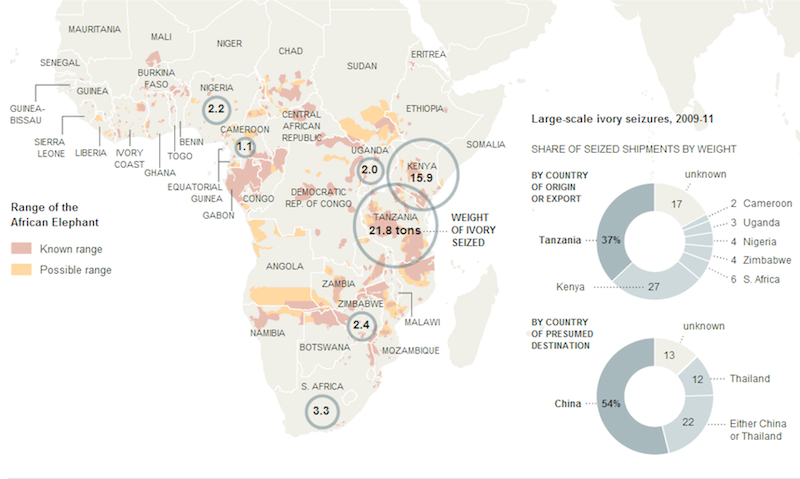 |
| African Elephant Illegal Trade |
 When I visited Botswana in 2007, and spent some time at the "Chobe National Park" I became aware of a huge problem that the Park administration was dealing with: ELEPHANTS
When I visited Botswana in 2007, and spent some time at the "Chobe National Park" I became aware of a huge problem that the Park administration was dealing with: ELEPHANTS
Their number had rised to an alarming figure of 120.000, 40.000 individuals beyond than what the Park itself could shelter, according to their estimated resources.
One of the solutions, besides misplacing some of the herds, was to arrange some old fashion AFRICAN SAFARIS which could allow the Park's Administration to control the species, therefore protecting others, with the advantage of rising some money to hire more rangers in order to look upon the park conservation.
Although shocking, the measure seemed to be focused on the protection of the various species which all depend on the Park resources.
I had the opportunity to see what enormous herds of elephants can do to vegetation. It simply disappears and the horizon looks like Ground Zero. The image I had was that a bomb had dropped and nothing was left besides brown dry land. All around me there wasn't literally nothing left. The land was absolutely flat. No trees, no flowers. Nothing. When we talk about a group of 20 or 30 individuals, each one of them consuming trees, trunks, grass, leaves, that may reach to 300 kgs a day, we are getting numbers like 9.000 Kg of vegetation in just one day. After a week the region is flat.
Following these sustainability problems some Parks tended to be more tolerant with poachering leaving some space for the quick development of trade channels, which tend to grow very quickly, due the enormous amount of money associated with IVORY TRADE. Quickly the situation involved to a dark elephant slaughter with thousands of elephants being killed every year, wiping out these big mammals from the face of the Earth. Tourists which have visited Africa for the last 5 years, say that the specie may have decreased enormously once they are now scarcely seen around.
China stays in the corner of the trade, (not only for elephants, but by far, for the dramatic outraging poaching of the last black rhinos) and ultimately that's their marked which is fueling the elephants slaughter and the underground ivory trade which is becoming increasingly militarized. Ivory is sold at $1,000 per pound in the Beijing streets which gives us a figure of the numbers involved.
Africa is in the midst of an epic elephant slaughter. Conservation groups say poachers are wiping out tens of thousands of elephants a year, more than at any time in the previous two decades.
Some parks are now in a the middle of a battlefield trying to stop trade and the slaughter. Therefore it was with great joy that I heard last week's news about TANZANIA's government decision on not to trade 137 tons of ivory stockpiled in their warehouses, representing millions of dollars.
"We want to sell part of the stockpile. We plan to use revenue from the sale to beef up measures to fight elephant poaching, which is becoming more and more worrying," Nyalandu told journalists.
He said the government was not going to sell smuggled ivory but of those which died of natural causes, noting that Tanzania has more than 137 tonnes of ivory stockpiled.
Good News!


Sem comentários:
Enviar um comentário